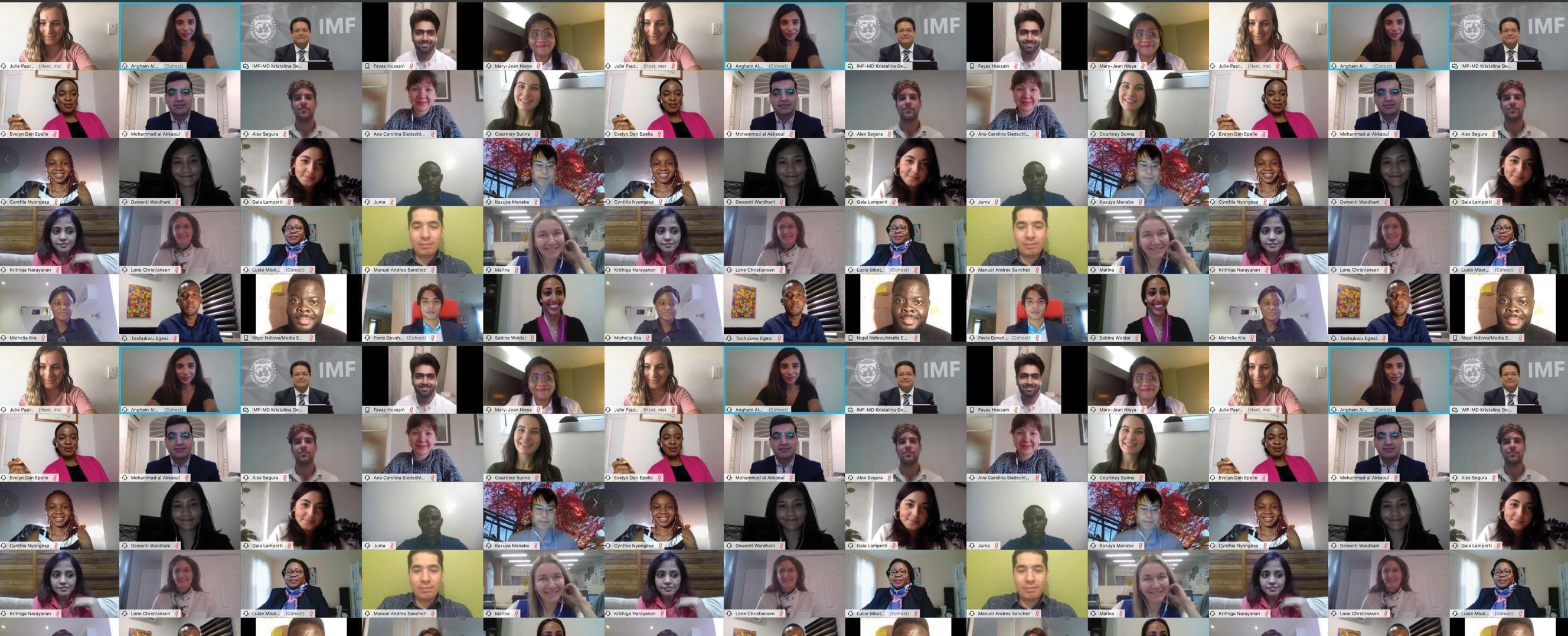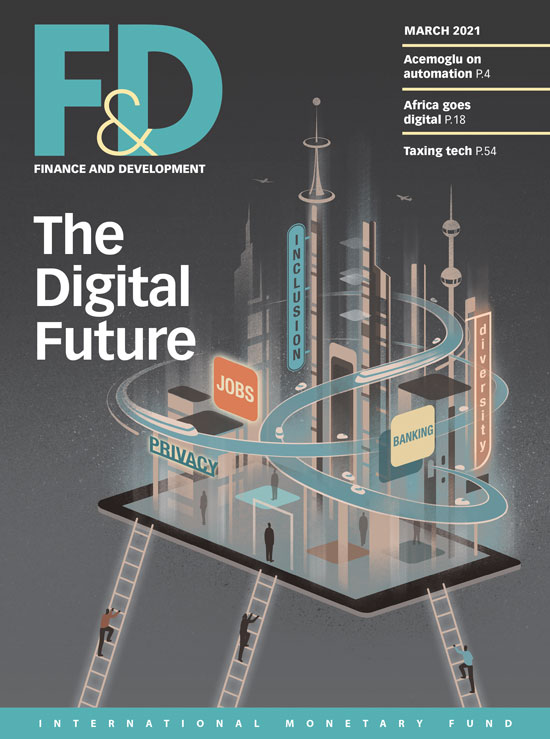Global youth discuss how best to bring about a greener, more inclusive world after COVID-19
Last fall, IMF launched its first-ever Youth Fellowship Contest to provide aspiring young leaders with an opportunity to join the IMF at the forefront of the COVID-19 crisis response, and to share their unique perspective on the global effort to build forward better – towards a greener, fairer and more inclusive recovery. We received nearly 700 submissions from around the world, and ultimately chose 26 fellows from 25 countries. A mix of bloggers/vloggers, journalists, community leaders, communications experts, young professionals, and students were selected.
Fellows participated in a training program with senior IMF staff to discuss priority economic issues such as inclusive growth, gender equality, climate change and fintech. The program also featured media experts from the Financial Times, CNBC, and Politico, who trained fellows in multimedia storytelling.
After completing the training program and participating in various events at the IMF-World Bank Annual Meetings, fellows were asked to share their policy proposals to address the current crisis, and how best to ensure a greener and more inclusive recovery after the pandemic—one that creates more jobs and opportunities for youth.
Four winners were selected, and their submissions can be found below.
Krithiga Narayanan, Multi-Platform Journalist, India
Gender Inclusive Policies for a Faster Recovery

Krithiga discusses policy recommendations to create more (remote) jobs, provide necessary technical support, and skills development for young women in both urban and rural areas in India.
According to the IMF World Economic Outlook of October 2020, India's GDP is expected to have contracted severely, by 10.28 percent. A sharp decline in consumption, which caused a reduction in domestic demand and a collapse in investment, has been cited as among the reasons for this contraction. The IMF
also estimates a decrease in India's per capita income and a rise in inflation, which is reflected in higher food prices and supply disruption. IMF Chief Economist Gita Gopinath, while presenting the World Economic Outlook, said that in order to protect vulnerable people, a strong safety net should be available for those who lose jobs, and new opportunities should be provided for the unemployed to help them transition into new sectors. IMF research says that lockdowns tend to have a disproportionate effect on economically vulnerable people such as women and youth. Women are more vulnerable to job losses, and existing gender inequalities are increasing due to the pandemic. In India, women represent nearly 48 percent of the population, but their labor force participation rate is just 20 percent, and their economic contribution is only 17 percent of India's GDP, which is less than half the global average. Hence, promoting gender equality needs to be prioritized for a faster, stable, and resilient recovery.
Gender-inclusive policies are the need of the hour: they will lead to more participation of women in the labor force, which would boost economic growth, provide security for the vulnerable, and help create a more equal society. Urgent policy intervention is required for the creation of jobs for young women in both the formal and informal sectors in India. This will help women who lost their jobs due to the pandemic and allow new female workers to join the labor force quickly. But there are many structural and sociocultural barriers that make it difficult for women to seek work and enter and stay in the workforce. Some of these barriers are inadequate public transportation, unsafe public spaces, poor enforcement of sexual harassment laws, discrimination in the workplace, unequal wages, and patrilocal early marriages that place the burden of caring for the family entirely on women. The social status of families is also perceived to be low if women go to work, and certain jobs are not socially acceptable for women. Hence, the existence of such barriers must be acknowledged and addressed in order to increase the economic participation of women. These barriers must also be taken into account when policy measures are designed and implemented. Policy interventions that promote gender equality can help bring about a cultural shift in India regarding working women.
Indian women in both urban and rural areas are more likely to enter the workforce if jobs are available near their homes. This reflects factors such as cultural norms and mobility constraints. Decentralized job opportunities for young women, with new job clusters in formal and informal sectors equally dispersed in both urban and rural areas, are vital. To create more jobs, women’s entrepreneurship in small and medium enterprises is also important and should be encouraged in sectors such as agriculture, manufacturing, textiles, media, health, technology, food, education, and services in both urban and rural areas. But women-led entrepreneurial ventures in India struggle to create jobs because of challenges such as lack of funds, difficulties in market penetration, gender bias, the digital divide, lack of qualified employees, and a complex regulatory environment. Policy initiatives for women’s entrepreneurship should hence help with fundraising, ease of doing business, infrastructure, business support, and skill development. Companies should also be incentivized to hire more women.
Policy initiatives must help create more remote jobs by providing necessary technical support and skill development. This will empower young women with mobility constraints to join the workforce. Urban online food delivery platforms that were started recently, such as FoodCloud and The Yummy Idea have helped empower many Indian women to start food businesses from their homes. The digital divide between urban and rural areas should be addressed by providing low-cost internet services and technology, which will help increase market penetration and empower more women from both urban and rural areas to join the workforce. The Indian government's current fiscal relief measures are mostly in the form of lending support and credit guarantees.
This can be further expanded to more direct fiscal support, especially for gender-inclusive policy measures. Even though the IMF predicts GDP growth of 8.8 percent for India in 2021, the recovery is set to be uneven and uncertain. Hence, we have to act now to promote gender equality and help build a more equal society for a faster and stable recovery. Countries cannot achieve economic growth when women, who represent nearly half of the population, are left behind.
Cynthia Nyongesa, Youth Advocate, Kenya
Policies to Create Jobs and Opportunities for African Youth

Cynthia calls upon policy makers to promote employment, sustainable economic growth and reduce poverty for youth, while also creating jobs which are safe and inclusive.
Mary-Jean Nleya, Conversationalist on Global Issues, Botswana
A Digitally Transformed Economic Recovery that Works for African Youth

Mary-Jean writes about how a pro-digital policy agenda, including public and private sector investments in digital infrastructure and technologies, can accelerate the economic recovery.
In recent months, the COVID-19 pandemic almost instantly upended normalcy for the entire global population. Economies grinded to a halt, livelihoods were lost and the 2020 global economy saw a 4.4% decline. Millions of young people were especially disproportionately affected – with interruptions to their education, shortages of entry level jobs for young graduates and overall job cuts in the labour market.
The policy priorities and investments for reshaping the recovery of a resilient economy that works for young people is to ask: what part of our economy resisted the pandemic? The answer is: the digital economy.
The use of digital technologies and digitalization acted as enablers to the human experience in many ways in recent months. The pandemic has on the one hand shown the significance of digital connectivity; and on the other hand revealed underlying digital inequities, which if unaddressed will fuel divides in society.
Looking specifically at the African continent, developmental gains made in recent decades are under threat. According to the IMF’s Regional Economic Outlook, sub-Saharan Africa’s GDP is expected to shrink by 3% in 2020.
The future of Africa is dependent on the manner in which its young citizens are supported throughout this economic crisis. In 2016, during a grassroots reporting documentary project titled: “ICTs in Public Education in Africa”, I interviewed a secondary school student in Malawi, and she said the following to me: “At first, I did not know how to use a computer […], at home we did not have one, so I was exposed to computers here at school. Right now, I know how to do different things on a computer. And I want to do an ICT program”. This demonstrates that inculcating IT training in the public-school system in Africa ensures that youth (particularly in low-income communities) acquire digital skills necessary to benefit from emerging economic opportunities in the digital economy.
A digitally transformed economic recovery that particularly works for Africa’s youth adversely affected by the pandemic requires policymakers to consider the following four policy priorities:
1. Cross-sectoral partnerships between public and private actors
To ensure that digital divides are bridged and universal access to the internet is a reality for all of Africa’s young people will require a $100 billion investment over the next decade. In gearing up for this long ascent of building back a better economy, it is important that governments collaborate with stakeholders in the private sector by using a combination of government incentives and leveraging private sector expertise for needed investments in digital infrastructure such as subsea cables and cross-border terrestrial links. IMF research found that increasing internet access by 10% of the population in sub-Saharan Africa could grow per capita GDP by 1% – 4%.
2. Democratizing ICTs and ICT-powered public education/ training
The benefits of an inclusive ICT policy, that both democratizes access to ICTs as well as provides an IT education, will prepare young people for the jobs of the future; and thereby enable young people to have economic and social gains. In 2018, the Click-On Kaduna training initiative – a collaborative effort between the Kaduna state government and global technology companies, such as IBM, to train low-income youth – saw Wacom donate technological equipment to the trainees and incorporated an industry-focused curriculum that satisfied industry standards to prepare the trainees for current industry needs.
3. Linking traineeships with direct employment opportunities for youth
My experience interviewing unemployed African youth has revealed that while many are educated, they cannot find suitable jobs. Policy initiatives should link traineeships with job opportunities for African youth. In the Click-On Kaduna program, the Kaduna state government’s partnership with technology companies also had direct work opportunities facilitated by the program, including apprenticeships, freelance consulting and job opportunities for the young trainees after the conclusion of their program.
4. Incorporating a circular economy in the digital transformation agenda
Part of building back a better and digitally transformed economy includes addressing the threatening climate crisis – which is a threat to a resilient economic recovery. E-waste accounts for 5% of global waste – which is lost value of up to $10 billion in raw materials. It is time to foster recycling raw materials, contained in discarded electronics, into the making of technological products as a policy and legislative imperative to reduce electronic waste arriving in landfills.
A digital-focused economic recovery, supported by suitable public policies, has the propensity to drive job opportunities, entrepreneurship and innovation for young people, particularly in low-income countries. While it cannot be ignored that a resilient and sustainable economic recovery requires tackling the health crisis; placing young people at the centre of a pro-digital policy agenda, can accelerate the economic recovery. This will ensure that, in the long-term, society does not lose the productivity of an entire generation due to COVID-19.
Alex Segura, Foreign Correspondent, Spain
Can Fintech Companies Help Close the Gender Gap in Financial Inclusion?

Alex argues that governments should aim to create public policies which increase women’s access to microcredit, digital ID and education, while also working alongside fintech companies.
Opinions expressed in articles and other materials are those of the authors; they do not necessarily represent the views of the IMF and its Executive Board, or IMF policy.








